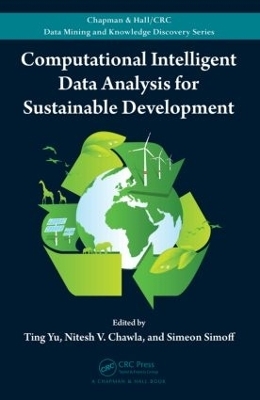
Computational Intelligent Data Analysis for Sustainable Development
Chapman & Hall/CRC (Verlag)
978-1-4398-9594-8 (ISBN)
With a focus on integrated sustainability analysis, the book presents a large-scale quadratic programming algorithm to expand high-resolution input-output tables from the national scale to the multinational scale to measure the carbon footprint of the entire trade supply chain. It also quantifies the error or dispersion between different reclassification and aggregation schemas, revealing that aggregation errors have a high concentration over specific regions and sectors.
The book summarizes the latest contributions of the data analysis community to climate change research. A profuse amount of climate data of various types is available, providing a rich and fertile playground for future data mining and machine learning research. The book also pays special attention to several critical challenges in the science of climate extremes that are not handled by the current generation of climate models. It discusses potential conceptual and methodological directions to build a close integration between physical understanding, or physics-based modeling, and data-driven insights.
The book then covers the conservation of species and ecologically valuable land. A case study on the Pennsylvania Dirt and Gravel Roads Program demonstrates that multiple-objective linear programming is a more versatile and efficient approach than the widely used benefit targeting selection process.
Moving on to renewable energy and the need for smart grids, the book explores how the ongoing transformation to a sustainable energy system of renewable sources leads to a paradigm shift from demand-driven generation to generation-driven demand. It shows how to maximize renewable energy as electricity by building a supergrid or mixing renewable sources with demand management and storage. It also presents intelligent data analysis for real-time detection of disruptive events from power system frequency data collected using an existing Internet-based frequency monitoring network as well as evaluates a set of computationally intelligent techniques for long-term wind resource assessment.
In addition, the book gives an example of how temporal and spatial data analysis tools are used to gather knowledge about behavioral data and address important social problems such as criminal offenses. It also applies constraint logic programming to a planning problem: the environmental and social impact assessment of the regional energy plan of the Emilia-Romagna region of Italy.
Sustainable development problems, such as global warming, resource shortages, global species loss, and pollution, push researchers to create powerful data analysis approaches that analysts can then use to gain insight into these issues to support rational decision making. This volume shows both the data analysis and sustainable development communities how to use intelligent data analysis tools to address practical problems and encourages researchers to develop better methods.
Ting Yu, Ph.D., is an honorary research fellow in the Integrated Sustainability Analysis Group at the University of Sydney. He is also a transport modeler for the Transport for NSW. His research interests include machine learning, data mining, parallel computing, applied economics, and sustainability analysis. He earned a Ph.D. in computing science from the University of Technology, Sydney. Nitesh Chawla, Ph.D., is an associate professor in the Department of Computer Science and Engineering, director of the Interdisciplinary Center for Network Science and Applications, and director of the Data Inference Analysis and Learning Lab at the University of Notre Dame. A recipient of multiple awards for research and teaching, Dr. Chawla is chair of the IEEE Computational Intelligence Society Data Mining Technical Committee and associate editor of IEEE Transactions on Systems, Man and Cybernetics (Part B) and Pattern Recognition Letters. His research focuses on machine learning, data mining, and network science. Simeon Simoff, Ph.D., is dean of the School of Computing, Engineering and Mathematics at the University of Western Sydney. He is also a founding director and fellow of the Institute of Analytics Professionals of Australia. He serves on the American Society of Civil Engineering Technical Committees on Data and Information Management and on Intelligent Computing and is an editor of the Australian Computer Society’s Conferences in Research and Practice in Information Technology.
Integrated Sustainability Analysis. Computational Intelligent Data Analysis for Climate Change. Computational Intelligent Data Analysis for Biodiversity and Species Conservation. Computational Intelligent Data Analysis for Smart Grid and Renewable Energy. Computational Intelligent Data Analysis for Sociopolitical Sustainability. Index.
| Erscheint lt. Verlag | 4.4.2013 |
|---|---|
| Reihe/Serie | Chapman & Hall/CRC Data Mining and Knowledge Discovery Series |
| Zusatzinfo | 19 Tables, black and white; 81 Illustrations, black and white |
| Sprache | englisch |
| Maße | 156 x 234 mm |
| Gewicht | 748 g |
| Themenwelt | Informatik ► Datenbanken ► Data Warehouse / Data Mining |
| Mathematik / Informatik ► Informatik ► Theorie / Studium | |
| Technik ► Umwelttechnik / Biotechnologie | |
| ISBN-10 | 1-4398-9594-5 / 1439895945 |
| ISBN-13 | 978-1-4398-9594-8 / 9781439895948 |
| Zustand | Neuware |
| Haben Sie eine Frage zum Produkt? |
aus dem Bereich


